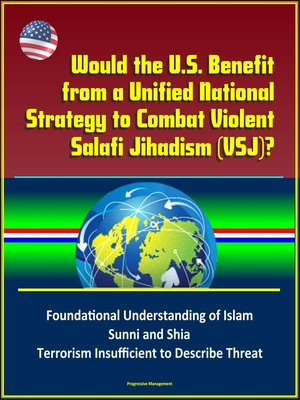Would the U.S. Benefit from a Unified National Strategy to Combat Violent Salafi Jihadism (VSJ)? Foundational Understanding of Islam, Sunni and Shia, Terrorism Insufficient to...
ebook
By Progressive Management

Sign up to save your library
With an OverDrive account, you can save your favorite libraries for at-a-glance information about availability. Find out more about OverDrive accounts.
Find this title in Libby, the library reading app by OverDrive.



Search for a digital library with this title
Title found at these libraries:
| Loading... |
This excellent report has been professionally converted for accurate flowing-text e-book format reproduction. Violent Salafi jihadism, or VSJ, motivated the September 11 hijackers, but it is poorly understood by homeland security practitioners and not addressed in U.S. national strategies. This study argues that using precise language to define this threat is necessary to achieve a common understanding of the VSJ movement and posits that, based on the resources focused on this threat for the past 14 years, a unified national strategy is warranted.
The use of the generic term "terrorism" has resulted in a vast array of counterterrorism "experts," many of whom have little or no understanding of VSJ. An unintended consequence of conflating VSJ with motivation behind other Muslim groups using terrorist tactics is that it feeds the false narrative that VSJ represents Islam. Muslims in Asia and Africa are by far more often victimized by VSJ than is the "far enemy" in Europe and the United States.
This study argues that imprecise language referencing the threat from VSJ has led to diluted and sometimes counterproductive, counterterrorism strategies. It also argues that the United States should disaggregate terrorist groups that do not directly threaten the United States and, instead, focus on VSJ with unity of effort across the federal government.
This study provides the reader an overview of Islam and Islamism as a foundation for understanding Salafism, if only to provide context as to what VSJ is and, perhaps more importantly, what it is not. Additionally, it explains the evolution and history of VSJ, as well as related factors of takfir and Wahhabism, and contrasts the threat posed by VSJ with definitions and language currently used in national strategies. A disaggregation of the various subgroups under Islam, even the relatively small percentage that commit terrorist acts, is key to moving towards workable and targeted solutions, as is understanding that Muslims are the primary victims of VSJ. Understanding the intricacies of the violent Salafi jihadi ideology and the diversity of its adherents, why the U.S. is in the crosshairs, and how VSJ relates to the global geo-political environment is necessary in order to turn the tide on what appears to be an intractable conflict.
The doctrinal "bins" that inform how the U.S. combats and engages with VSJ are defined as counterterrorism, anti-terrorism, and countering violent extremism. These terms are used loosely across government at all levels in the U.S.; however, based on available documents, they do not provide a holistic framework for addressing the threat from VSJ. Currently, no single government agency is responsible for defining, understanding, and framing the VSJ threat for the U.S. In general terms, counterterrorism and anti-terrorism mean, respectively, offensively combating groups committing terrorist acts and defending against the damage terrorist tactics can inflict. This terminology does not discriminate among different groups that use terrorist tactics, simply defined as "politically motivated crime intended to modify the behavior of a target audience." Understanding the ideology and motivation is not part of the U.S. strategies reviewed for this study, which argues that differentiating between terrorist groups, in general, and between those using the banner of Islam, specifically, is key to productive strategy. The U.S. government has multiple official definitions of terrorism, which does not support the development of a unifying strategic position to combat VSJ.






